Shaoshuai Mou
Safe Online Control-Informed Learning
Dec 23, 2025Abstract:This paper proposes a Safe Online Control-Informed Learning framework for safety-critical autonomous systems. The framework unifies optimal control, parameter estimation, and safety constraints into an online learning process. It employs an extended Kalman filter to incrementally update system parameters in real time, enabling robust and data-efficient adaptation under uncertainty. A softplus barrier function enforces constraint satisfaction during learning and control while eliminating the dependence on high-quality initial guesses. Theoretical analysis establishes convergence and safety guarantees, and the framework's effectiveness is demonstrated on cart-pole and robot-arm systems.
Leveraging Perturbation Robustness to Enhance Out-of-Distribution Detection
Mar 24, 2025Abstract:Out-of-distribution (OOD) detection is the task of identifying inputs that deviate from the training data distribution. This capability is essential for safely deploying deep computer vision models in open-world environments. In this work, we propose a post-hoc method, Perturbation-Rectified OOD detection (PRO), based on the insight that prediction confidence for OOD inputs is more susceptible to reduction under perturbation than in-distribution (IND) inputs. Based on the observation, we propose an adversarial score function that searches for the local minimum scores near the original inputs by applying gradient descent. This procedure enhances the separability between IND and OOD samples. Importantly, the approach improves OOD detection performance without complex modifications to the underlying model architectures. We conduct extensive experiments using the OpenOOD benchmark~\cite{yang2022openood}. Our approach further pushes the limit of softmax-based OOD detection and is the leading post-hoc method for small-scale models. On a CIFAR-10 model with adversarial training, PRO effectively detects near-OOD inputs, achieving a reduction of more than 10\% on FPR@95 compared to state-of-the-art methods.
Reward-Based Collision-Free Algorithm for Trajectory Planning of Autonomous Robots
Feb 10, 2025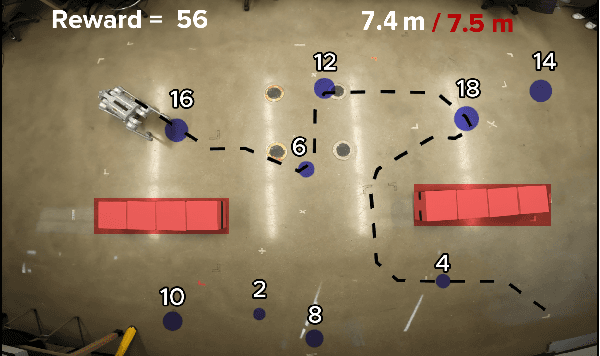
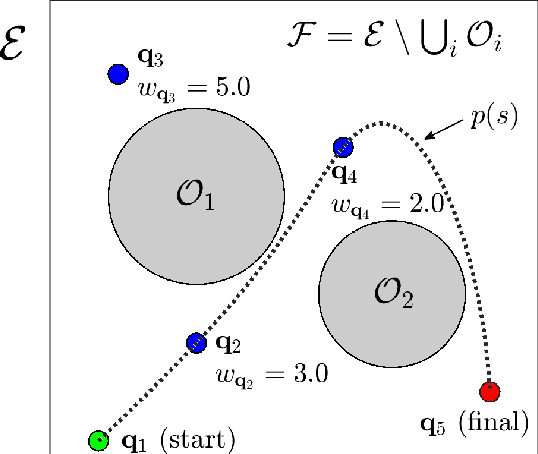
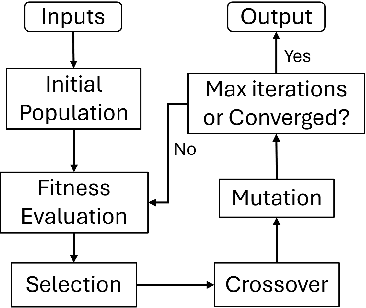
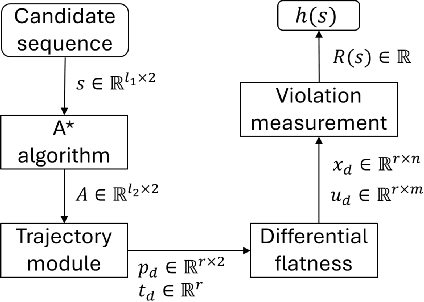
Abstract:This paper introduces a new mission planning algorithm for autonomous robots that enables the reward-based selection of an optimal waypoint sequence from a predefined set. The algorithm computes a feasible trajectory and corresponding control inputs for a robot to navigate between waypoints while avoiding obstacles, maximizing the total reward, and adhering to constraints on state, input and its derivatives, mission time window, and maximum distance. This also solves a generalized prize-collecting traveling salesman problem. The proposed algorithm employs a new genetic algorithm that evolves solution candidates toward the optimal solution based on a fitness function and crossover. During fitness evaluation, a penalty method enforces constraints, and the differential flatness property with clothoid curves efficiently penalizes infeasible trajectories. The Euler spiral method showed promising results for trajectory parameterization compared to minimum snap and jerk polynomials. Due to the discrete exploration space, crossover is performed using a dynamic time-warping-based method and extended convex combination with projection. A mutation step enhances exploration. Results demonstrate the algorithm's ability to find the optimal waypoint sequence, fulfill constraints, avoid infeasible waypoints, and prioritize high-reward ones. Simulations and experiments with a ground vehicle, quadrotor, and quadruped are presented, complemented by benchmarking and a time-complexity analysis.
Online Control-Informed Learning
Oct 04, 2024Abstract:This paper proposes an Online Control-Informed Learning (OCIL) framework, which synthesizes the well-established control theories to solve a broad class of learning and control tasks in real time. This novel integration effectively handles practical issues in machine learning such as noisy measurement data, online learning, and data efficiency. By considering any robot as a tunable optimal control system, we propose an online parameter estimator based on extended Kalman filter (EKF) to incrementally tune the system in real time, enabling it to complete designated learning or control tasks. The proposed method also improves robustness in learning by effectively managing noise in the data. Theoretical analysis is provided to demonstrate the convergence and regret of OCIL. Three learning modes of OCIL, i.e. Online Imitation Learning, Online System Identification, and Policy Tuning On-the-fly, are investigated via experiments, which validate their effectiveness.
HOLA-Drone: Hypergraphic Open-ended Learning for Zero-Shot Multi-Drone Cooperative Pursuit
Sep 13, 2024Abstract:Zero-shot coordination (ZSC) is a significant challenge in multi-agent collaboration, aiming to develop agents that can coordinate with unseen partners they have not encountered before. Recent cutting-edge ZSC methods have primarily focused on two-player video games such as OverCooked!2 and Hanabi. In this paper, we extend the scope of ZSC research to the multi-drone cooperative pursuit scenario, exploring how to construct a drone agent capable of coordinating with multiple unseen partners to capture multiple evaders. We propose a novel Hypergraphic Open-ended Learning Algorithm (HOLA-Drone) that continuously adapts the learning objective based on our hypergraphic-form game modeling, aiming to improve cooperative abilities with multiple unknown drone teammates. To empirically verify the effectiveness of HOLA-Drone, we build two different unseen drone teammate pools to evaluate their performance in coordination with various unseen partners. The experimental results demonstrate that HOLA-Drone outperforms the baseline methods in coordination with unseen drone teammates. Furthermore, real-world experiments validate the feasibility of HOLA-Drone in physical systems. Videos can be found on the project homepage~\url{https://sites.google.com/view/hola-drone}.
C3D: Cascade Control with Change Point Detection and Deep Koopman Learning for Autonomous Surface Vehicles
Mar 14, 2024Abstract:In this paper, we discuss the development and deployment of a robust autonomous system capable of performing various tasks in the maritime domain under unknown dynamic conditions. We investigate a data-driven approach based on modular design for ease of transfer of autonomy across different maritime surface vessel platforms. The data-driven approach alleviates issues related to a priori identification of system models that may become deficient under evolving system behaviors or shifting, unanticipated, environmental influences. Our proposed learning-based platform comprises a deep Koopman system model and a change point detector that provides guidance on domain shifts prompting relearning under severe exogenous and endogenous perturbations. Motion control of the autonomous system is achieved via an optimal controller design. The Koopman linearized model naturally lends itself to a linear-quadratic regulator (LQR) control design. We propose the C3D control architecture Cascade Control with Change Point Detection and Deep Koopman Learning. The framework is verified in station keeping task on an ASV in both simulation and real experiments. The approach achieved at least 13.9 percent improvement in mean distance error in all test cases compared to the methods that do not consider system changes.
Distributed Optimization via Kernelized Multi-armed Bandits
Dec 07, 2023Abstract:Multi-armed bandit algorithms provide solutions for sequential decision-making where learning takes place by interacting with the environment. In this work, we model a distributed optimization problem as a multi-agent kernelized multi-armed bandit problem with a heterogeneous reward setting. In this setup, the agents collaboratively aim to maximize a global objective function which is an average of local objective functions. The agents can access only bandit feedback (noisy reward) obtained from the associated unknown local function with a small norm in reproducing kernel Hilbert space (RKHS). We present a fully decentralized algorithm, Multi-agent IGP-UCB (MA-IGP-UCB), which achieves a sub-linear regret bound for popular classes for kernels while preserving privacy. It does not necessitate the agents to share their actions, rewards, or estimates of their local function. In the proposed approach, the agents sample their individual local functions in a way that benefits the whole network by utilizing a running consensus to estimate the upper confidence bound on the global function. Furthermore, we propose an extension, Multi-agent Delayed IGP-UCB (MAD-IGP-UCB) algorithm, which reduces the dependence of the regret bound on the number of agents in the network. It provides improved performance by utilizing a delay in the estimation update step at the cost of more communication.
Neighboring Extremal Optimal Control Theory for Parameter-Dependent Closed-loop Laws
Dec 07, 2023Abstract:This study introduces an approach to obtain a neighboring extremal optimal control (NEOC) solution for a closed-loop optimal control problem, applicable to a wide array of nonlinear systems and not necessarily quadratic performance indices. The approach involves investigating the variation incurred in the functional form of a known closed-loop optimal control law due to small, known parameter variations in the system equations or the performance index. The NEOC solution can formally be obtained by solving a linear partial differential equation, akin to those encountered in the iterative solution of a nonlinear Hamilton-Jacobi equation. Motivated by numerical procedures for solving these latter equations, we also propose a numerical algorithm based on the Galerkin algorithm, leveraging the use of basis functions to solve the underlying Hamilton-Jacobi equation of the original optimal control problem. The proposed approach simplifies the NEOC problem by reducing it to the solution of a simple set of linear equations, thereby eliminating the need for a full re-solution of the adjusted optimal control problem. Furthermore, the variation to the optimal performance index can be obtained as a function of both the system state and small changes in parameters, allowing the determination of the adjustment to an optimal control law given a small adjustment of parameters in the system or the performance index. Moreover, in order to handle large known parameter perturbations, we propose a homotopic approach that breaks down the single calculation of NEOC into a finite set of multiple steps. Finally, the validity of the claims and theory is supported by theoretical analysis and numerical simulations.
Adaptive Policy Learning to Additional Tasks
May 24, 2023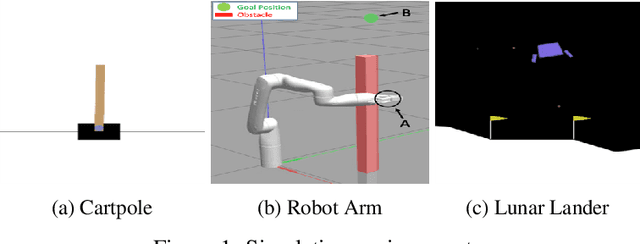

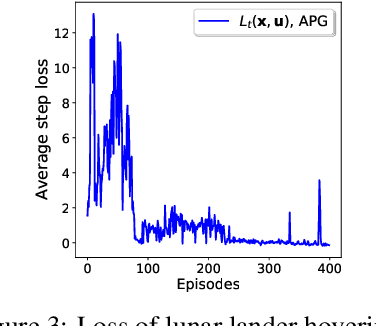
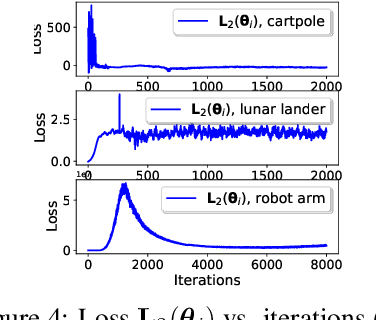
Abstract:This paper develops a policy learning method for tuning a pre-trained policy to adapt to additional tasks without altering the original task. A method named Adaptive Policy Gradient (APG) is proposed in this paper, which combines Bellman's principle of optimality with the policy gradient approach to improve the convergence rate. This paper provides theoretical analysis which guarantees the convergence rate and sample complexity of $\mathcal{O}(1/T)$ and $\mathcal{O}(1/\epsilon)$, respectively, where $T$ denotes the number of iterations and $\epsilon$ denotes the accuracy of the resulting stationary policy. Furthermore, several challenging numerical simulations, including cartpole, lunar lander, and robot arm, are provided to show that APG obtains similar performance compared to existing deterministic policy gradient methods while utilizing much less data and converging at a faster rate.
Policy Learning based on Deep Koopman Representation
May 24, 2023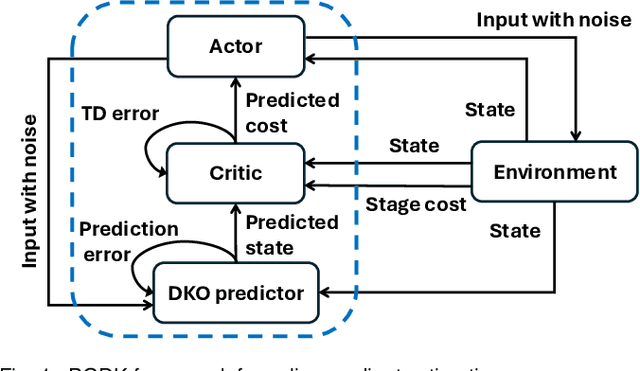
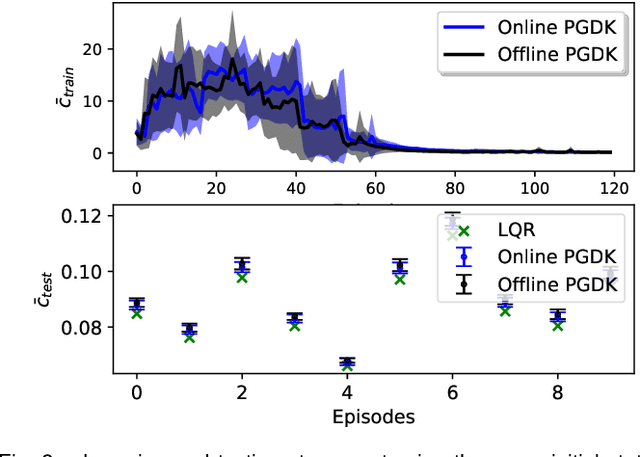
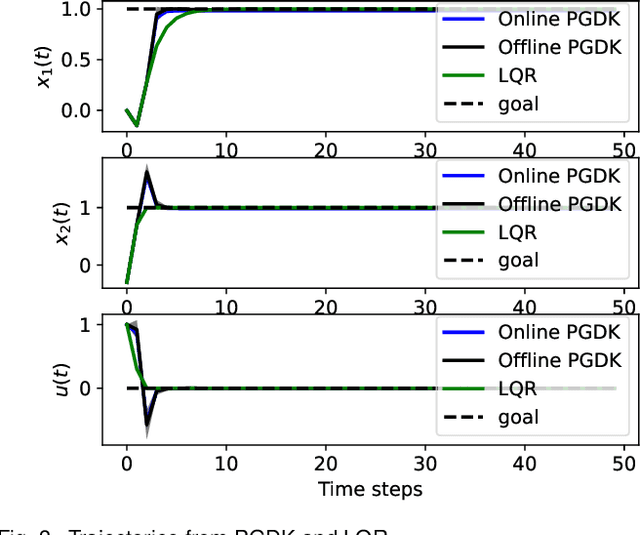
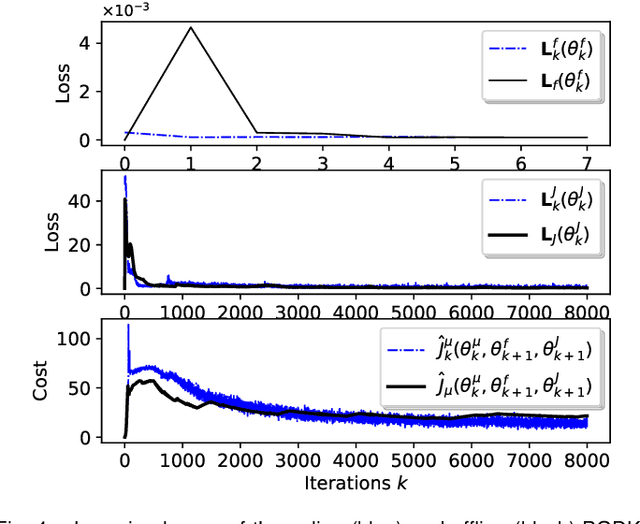
Abstract:This paper proposes a policy learning algorithm based on the Koopman operator theory and policy gradient approach, which seeks to approximate an unknown dynamical system and search for optimal policy simultaneously, using the observations gathered through interaction with the environment. The proposed algorithm has two innovations: first, it introduces the so-called deep Koopman representation into the policy gradient to achieve a linear approximation of the unknown dynamical system, all with the purpose of improving data efficiency; second, the accumulated errors for long-term tasks induced by approximating system dynamics are avoided by applying Bellman's principle of optimality. Furthermore, a theoretical analysis is provided to prove the asymptotic convergence of the proposed algorithm and characterize the corresponding sampling complexity. These conclusions are also supported by simulations on several challenging benchmark environments.
 Add to Chrome
Add to Chrome Add to Firefox
Add to Firefox Add to Edge
Add to Edge